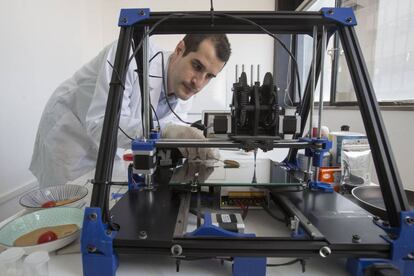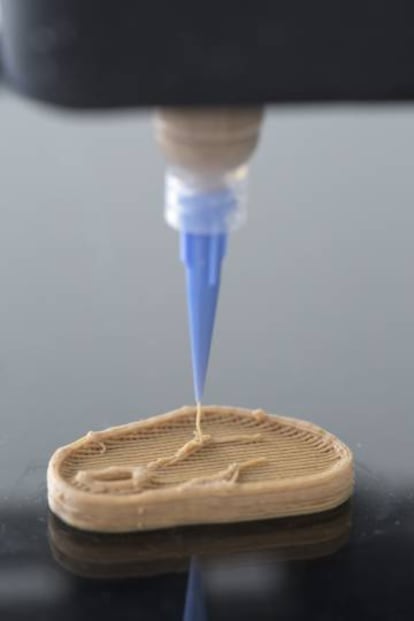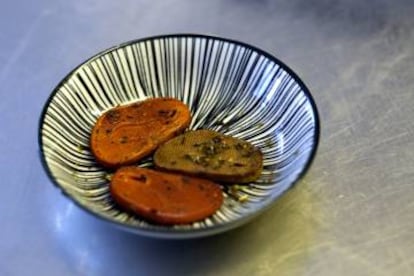Barcelona researcher develops 3D printer that makes ‘steaks’
Giuseppe Scionti hopes that his plant-based meat alternative can be used to reduce the impact of animal agriculture and help improve world nutrition

Barcelona is a world hub for research in haute cuisine and 3D printing. Now, a scientist named Giuseppe Scionti has brought both elements together by creating an alternative to meat that can be printed out. His “steaks” are made entirely of plant-based ingredients, and manage the difficult feat of imitating the texture of meat, if not quite the look.
A 31-year-old researcher from Milan who specializes in biomedicine and tissue engineering, Scionti has spent three years developing his creation at the Polytechnic University of Catalonia (UPC).

He sees his idea as a way to reduce the impact of animal agriculture, and also wants to present the project to the World Food Organization because the meat could be produced with specific properties to combat malnutrition.
And there might even be a niche for his steaks in the world of molecular cuisine. Scionti has already contacted celebrity chef Ferran Adrià and the research center run by the Roca brothers, who head the top-rated Celler de Can Roca restaurant in Girona. “They are interested in something that looks like a steak but tastes like a mushroom,” he sums up.
Wearing latex gloves, Scionti handles syringes that contain a straw-colored paste. The syringes are placed in the 3D printer and the system is configured; after a while, a long noodle emerges from the machine and is shaped into a tiny steak, following a design created by Scionti using AutoCAD software. It takes between 30 and 50 minutes to create a 100-gram piece of “meat.”
The project began while Scionti was working at UPC, when a colleague happened to mention that a prototype of a human ear implant that he was working on had a very realistic texture. The Italian researcher began thinking that if 3D printers could imitate human tissue that well, they should also be able to imitate animal tissue.
Several attempts
This is not the first attempt at developing an alternative to meat that is less detrimental to animals and the environment while improving global nutrition. In vitro or cultured meat is grown inside labs from animal-cell cultures, while plant-based vegetable meat is already being commercialized by companies such as Impossible Foods. But the first option is still expensive and has yet to find a substitute for fetal bovine serum, a key ingredient that normally implies slaughtering the cow and the embryo. The plant-based alternative tastes like meat, but is only presented as hamburgers or meatballs because it cannot imitate the texture of a steak.
They are interested in something that looks like a steak but tastes like a mushroom
Giuseppe Scionti, researcher
Scionti’s products are halfway between these two options. “I use techniques that are normally used for cultured meat, and techniques borrowed from bioprinting and adapted for use with materials for plant-based meat,” he explains.
The ingredients that go into a steak are protein powder (from rice or peas) and seaweed components – food that is normally consumed by vegetarians and vegans as dietary supplements.
“The difficulty lies in reorganizing the nanofibers from vegetable proteins to make them seem like animal proteins,” explains Scionti. “First you have to study the histology of the animal tissue, how the muscle fibers are organized, and then you have to try to replicate that with plant-based ingredients that have not been genetically modified.”
Once the steak comes out of the printer, it is ready for cooking. It makes a sizzling sound in the pan, just like any regular piece of meat. “They cook really well,” says Margarita, the cook at the university center where Scionti works. “They don’t burn or stick to the pan.”
The texture is unusual and has been likened to tofu, although it is more fibrous than soft. The flavor depends on the seasoning. “What’s this supposed to replace? Chicken?” asks Margarita.

Visually, the 3D-steak could use a little extra work in order to look more like the real thing. “Its appearance can be improved with an investment of time and new prototypes, since this aspect is very important from the consumer’s point of view,” admits Scionti. “We need to adapt the three-dimensional models to make them more complex, to differentiate the part that imitates fat from the part that imitates muscles or other tissues.”
For now, printing 100 grams of this meat alternative costs €2, although the price will go down as volume increases. “The technology allows for scalability, so that you don’t need lots of printers working simultaneously. With a continuous supply of material and several extruders working at the same time, it will be possible to create much more product in a lot less time.”
While he talks, the 3D printer continues to hiss as it weaves the steak. The machine was developed by the CIM Foundation, a tech center attached to UPC. Although the university itself is not part of the project, it has loaned Scionti a workspace to conduct his research.
Scionti has filed for a patent and in October he is planning to launch a startup, Nova Meat, to market his invention.
English version by Susana Urra.
Tu suscripción se está usando en otro dispositivo
¿Quieres añadir otro usuario a tu suscripción?
Si continúas leyendo en este dispositivo, no se podrá leer en el otro.
FlechaTu suscripción se está usando en otro dispositivo y solo puedes acceder a EL PAÍS desde un dispositivo a la vez.
Si quieres compartir tu cuenta, cambia tu suscripción a la modalidad Premium, así podrás añadir otro usuario. Cada uno accederá con su propia cuenta de email, lo que os permitirá personalizar vuestra experiencia en EL PAÍS.
¿Tienes una suscripción de empresa? Accede aquí para contratar más cuentas.
En el caso de no saber quién está usando tu cuenta, te recomendamos cambiar tu contraseña aquí.
Si decides continuar compartiendo tu cuenta, este mensaje se mostrará en tu dispositivo y en el de la otra persona que está usando tu cuenta de forma indefinida, afectando a tu experiencia de lectura. Puedes consultar aquí los términos y condiciones de la suscripción digital.








































